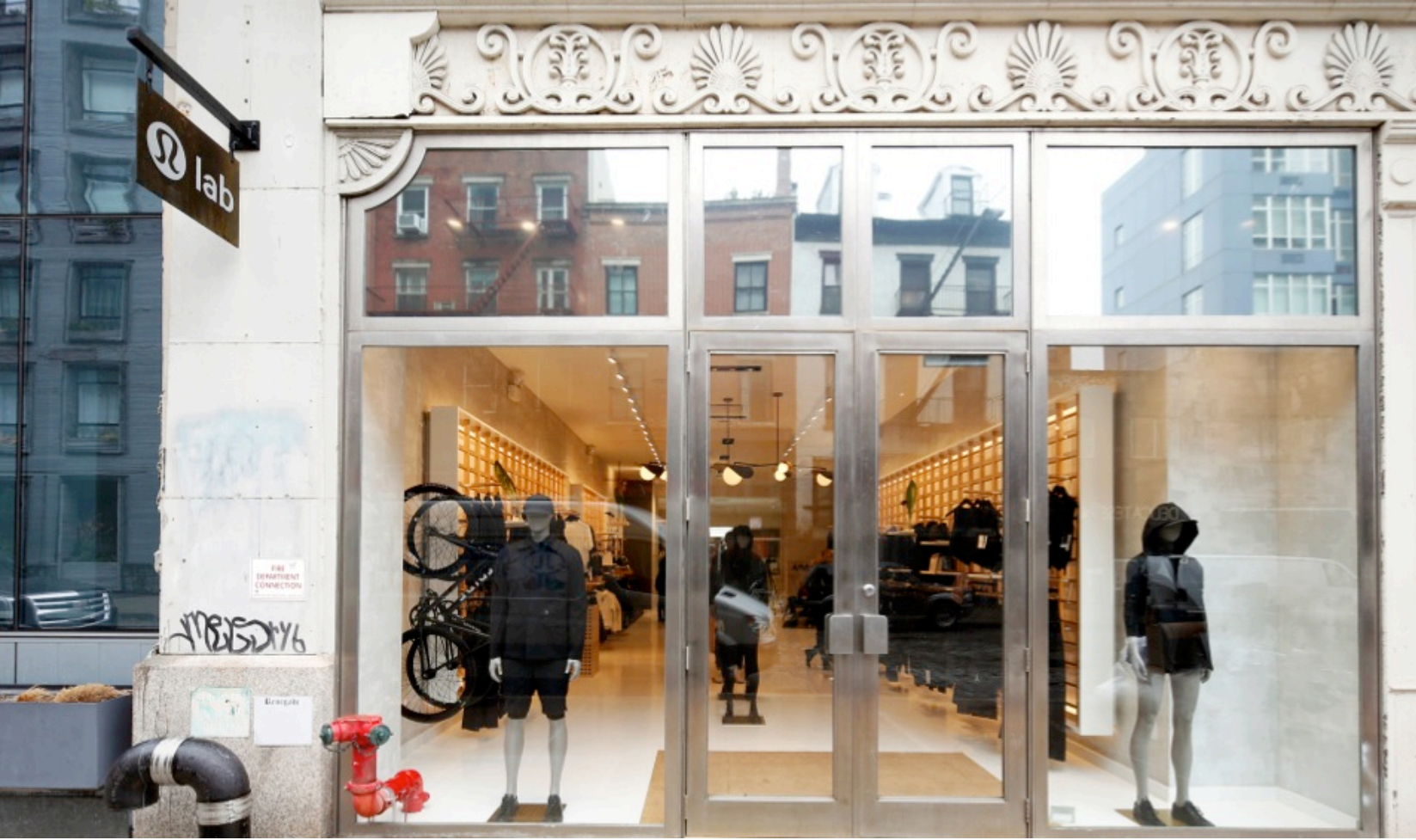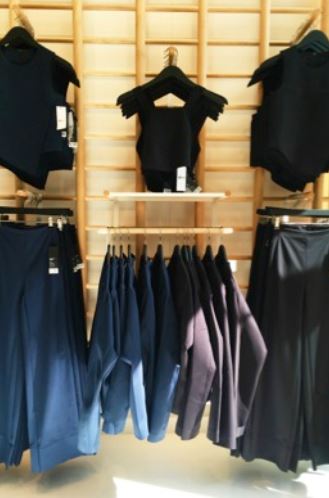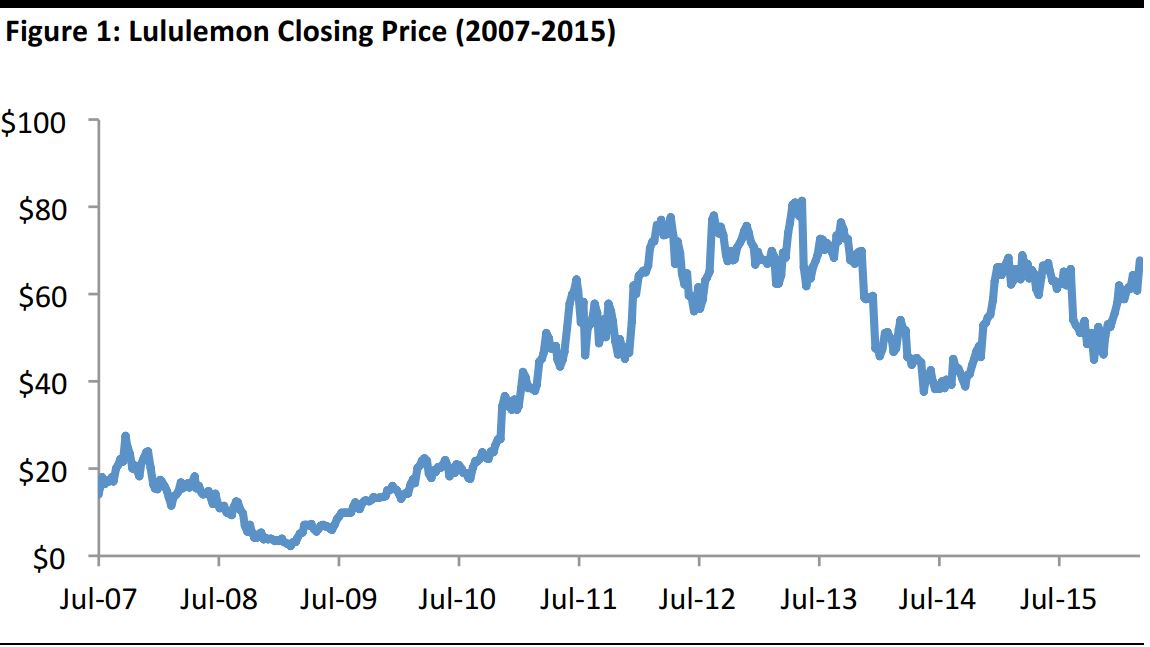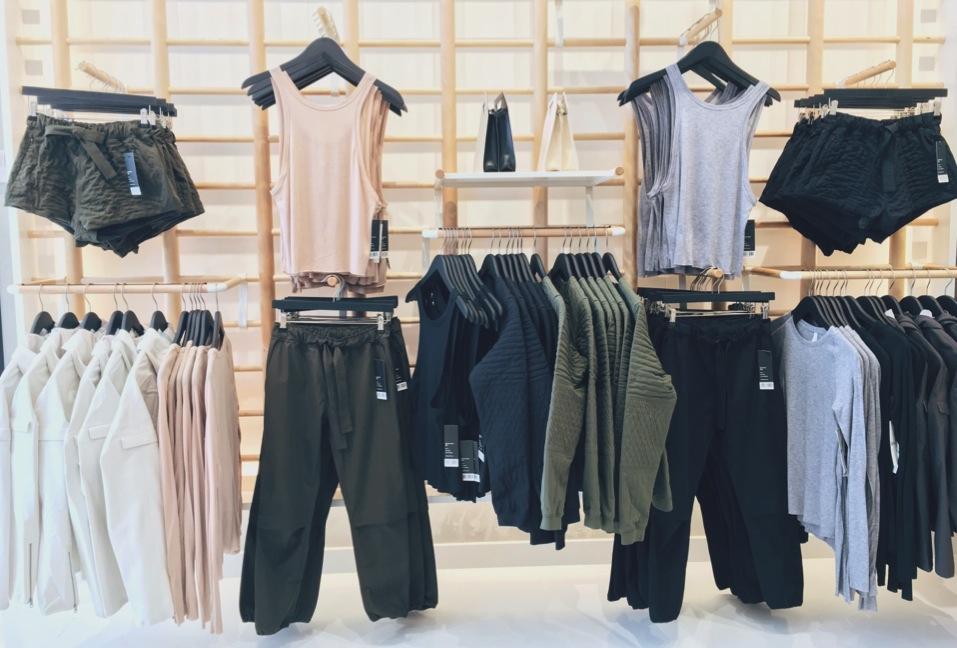

Lululemon Athletica opened a new store in Lower Manhattan on Tuesday, March 29. The store is called Lululemon Lab, and it differs from the brand’s other stores in that it is both a design and retail space. The store is Lululemon’s second design lab (the first is in Vancouver) and its 11
th New York City location.
Typical Lululemon items include stretchy yoga pants, strappy tank tops and printed sports bras. The new Lululemon Lab carries none of these. While some of the pieces in the store are functional for working out, many are more modern takes on functional streetwear, and even functional as business casualwear. The clothes in the store incorporate the technical fabrics that Lululemon is known for and reflect the brand’s focus on performance, but they can be worn to dinner without the wearer looking like she has arrived straight from yoga class.

Lululemon announced its
fourth-quarter and full-year earnings for 2015 on March 30: the company reported year-over-year revenue growth of 16.9% for the fourth quarter, and revenue beat the consensus estimate by more than $10 million. Earnings per share were $0.85, above the consensus estimate of $0.80.
Lululemon has faced a number of unusual moments in its history. The company’s founder often found himself in trouble after making public statements regarding politics, religion and women’s issues. Here is a brief summary of the company’s history:
Lululemon went public in July 2007, and by October of that year, the stock was worth $60, up from the debut of $25. The stock fell to $42 in November 2007, when
claims the clothing was made of seaweed were found to be completely false.
In 2009, the official Lululemon blog published a piece on
the origins of Lululemon that was not well-received by the greater public. The stocks’ value declined and earnings per share halved.
In March 2013, Lululemon recalled 17% of all women’s pants sold in stores because the fabric was see-through. In the wake of the debacle, the stock tumbled. The company reported earnings per share of $0.33 in May 2013, down from $0.76 in February of that year.
The controversial CEO claimed in a
Bloomberg TV interview in November 2013 that some women’s bodies “just don’t actually work” for the brand’s yoga pants. These statements were made in response to complaints that Lululemon pants were see-through. After earnings missed targets in June 2014, the stock dropped by 16%.

In February 2015,
the former CEO stepped down from the board of the company. In June 2015, he sold his entire stake in the company, worth more than $1 billion, ending his association with the company completely. That same month, Lululemon had to
recall more than 318,000 tops that had “dangerous drawstrings” that could snap back when pulled and cause injury to the face. Owners of the dangerous items could request a new drawstring for free that included directions on how to replace the old one.
Despite these issues, many of which centered on provocative personal statements coming from the head of the company, Lululemon has completely turned itself around and positioned itself for sustained success. These issues have likely added volatility to Lululemon’s stock price, illustrated in Figure 1 below.

The new Lululemon Lab in New York strays from the clothes that consumers are used to seeing at the brand’s stores. The colors are neutral, the clothes are angular and the price points are higher. Each item is made in batches of only about 50 items, giving them an air of exclusivity.
With this diversification, Lululemon joins other upper-market athleisure lines such as Adidas Y-3, Bandier and NikeLab. The company has made a move to “unbrand” the clothes offered in the store, making them unrecognizable to anyone who is unfamiliar with the brand and further blurring the line between athleticwear and other clothing.


 Lululemon Athletica opened a new store in Lower Manhattan on Tuesday, March 29. The store is called Lululemon Lab, and it differs from the brand’s other stores in that it is both a design and retail space. The store is Lululemon’s second design lab (the first is in Vancouver) and its 11th New York City location.
Typical Lululemon items include stretchy yoga pants, strappy tank tops and printed sports bras. The new Lululemon Lab carries none of these. While some of the pieces in the store are functional for working out, many are more modern takes on functional streetwear, and even functional as business casualwear. The clothes in the store incorporate the technical fabrics that Lululemon is known for and reflect the brand’s focus on performance, but they can be worn to dinner without the wearer looking like she has arrived straight from yoga class.
Lululemon Athletica opened a new store in Lower Manhattan on Tuesday, March 29. The store is called Lululemon Lab, and it differs from the brand’s other stores in that it is both a design and retail space. The store is Lululemon’s second design lab (the first is in Vancouver) and its 11th New York City location.
Typical Lululemon items include stretchy yoga pants, strappy tank tops and printed sports bras. The new Lululemon Lab carries none of these. While some of the pieces in the store are functional for working out, many are more modern takes on functional streetwear, and even functional as business casualwear. The clothes in the store incorporate the technical fabrics that Lululemon is known for and reflect the brand’s focus on performance, but they can be worn to dinner without the wearer looking like she has arrived straight from yoga class.
 Lululemon announced its fourth-quarter and full-year earnings for 2015 on March 30: the company reported year-over-year revenue growth of 16.9% for the fourth quarter, and revenue beat the consensus estimate by more than $10 million. Earnings per share were $0.85, above the consensus estimate of $0.80.
Lululemon has faced a number of unusual moments in its history. The company’s founder often found himself in trouble after making public statements regarding politics, religion and women’s issues. Here is a brief summary of the company’s history:
Lululemon went public in July 2007, and by October of that year, the stock was worth $60, up from the debut of $25. The stock fell to $42 in November 2007, when claims the clothing was made of seaweed were found to be completely false.
In 2009, the official Lululemon blog published a piece on the origins of Lululemon that was not well-received by the greater public. The stocks’ value declined and earnings per share halved.
In March 2013, Lululemon recalled 17% of all women’s pants sold in stores because the fabric was see-through. In the wake of the debacle, the stock tumbled. The company reported earnings per share of $0.33 in May 2013, down from $0.76 in February of that year.
The controversial CEO claimed in a Bloomberg TV interview in November 2013 that some women’s bodies “just don’t actually work” for the brand’s yoga pants. These statements were made in response to complaints that Lululemon pants were see-through. After earnings missed targets in June 2014, the stock dropped by 16%.
Lululemon announced its fourth-quarter and full-year earnings for 2015 on March 30: the company reported year-over-year revenue growth of 16.9% for the fourth quarter, and revenue beat the consensus estimate by more than $10 million. Earnings per share were $0.85, above the consensus estimate of $0.80.
Lululemon has faced a number of unusual moments in its history. The company’s founder often found himself in trouble after making public statements regarding politics, religion and women’s issues. Here is a brief summary of the company’s history:
Lululemon went public in July 2007, and by October of that year, the stock was worth $60, up from the debut of $25. The stock fell to $42 in November 2007, when claims the clothing was made of seaweed were found to be completely false.
In 2009, the official Lululemon blog published a piece on the origins of Lululemon that was not well-received by the greater public. The stocks’ value declined and earnings per share halved.
In March 2013, Lululemon recalled 17% of all women’s pants sold in stores because the fabric was see-through. In the wake of the debacle, the stock tumbled. The company reported earnings per share of $0.33 in May 2013, down from $0.76 in February of that year.
The controversial CEO claimed in a Bloomberg TV interview in November 2013 that some women’s bodies “just don’t actually work” for the brand’s yoga pants. These statements were made in response to complaints that Lululemon pants were see-through. After earnings missed targets in June 2014, the stock dropped by 16%.
 In February 2015, the former CEO stepped down from the board of the company. In June 2015, he sold his entire stake in the company, worth more than $1 billion, ending his association with the company completely. That same month, Lululemon had to recall more than 318,000 tops that had “dangerous drawstrings” that could snap back when pulled and cause injury to the face. Owners of the dangerous items could request a new drawstring for free that included directions on how to replace the old one.
Despite these issues, many of which centered on provocative personal statements coming from the head of the company, Lululemon has completely turned itself around and positioned itself for sustained success. These issues have likely added volatility to Lululemon’s stock price, illustrated in Figure 1 below.
In February 2015, the former CEO stepped down from the board of the company. In June 2015, he sold his entire stake in the company, worth more than $1 billion, ending his association with the company completely. That same month, Lululemon had to recall more than 318,000 tops that had “dangerous drawstrings” that could snap back when pulled and cause injury to the face. Owners of the dangerous items could request a new drawstring for free that included directions on how to replace the old one.
Despite these issues, many of which centered on provocative personal statements coming from the head of the company, Lululemon has completely turned itself around and positioned itself for sustained success. These issues have likely added volatility to Lululemon’s stock price, illustrated in Figure 1 below.
 The new Lululemon Lab in New York strays from the clothes that consumers are used to seeing at the brand’s stores. The colors are neutral, the clothes are angular and the price points are higher. Each item is made in batches of only about 50 items, giving them an air of exclusivity.
With this diversification, Lululemon joins other upper-market athleisure lines such as Adidas Y-3, Bandier and NikeLab. The company has made a move to “unbrand” the clothes offered in the store, making them unrecognizable to anyone who is unfamiliar with the brand and further blurring the line between athleticwear and other clothing.
The new Lululemon Lab in New York strays from the clothes that consumers are used to seeing at the brand’s stores. The colors are neutral, the clothes are angular and the price points are higher. Each item is made in batches of only about 50 items, giving them an air of exclusivity.
With this diversification, Lululemon joins other upper-market athleisure lines such as Adidas Y-3, Bandier and NikeLab. The company has made a move to “unbrand” the clothes offered in the store, making them unrecognizable to anyone who is unfamiliar with the brand and further blurring the line between athleticwear and other clothing.